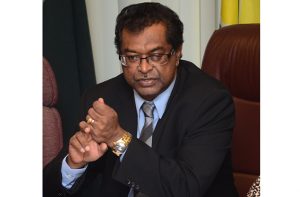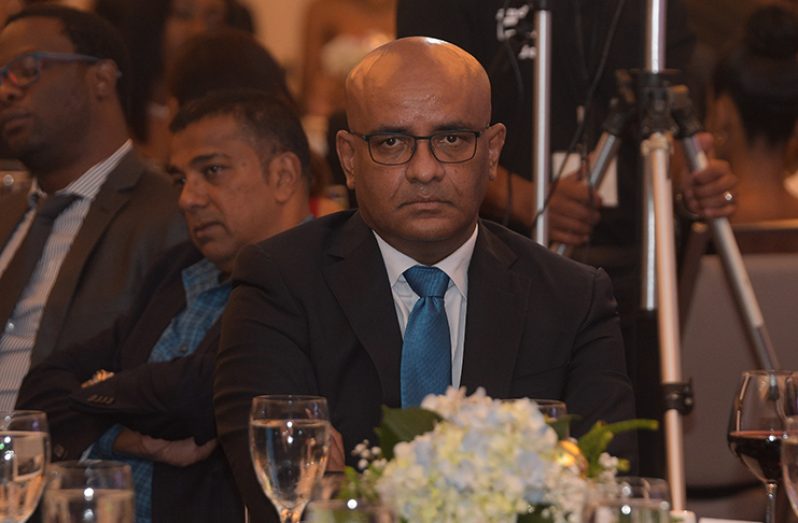…Ramjattan details PPP reaction to George Bacchus’ whistleblowing on death squad
MINISTER of Public Security, Khemraj Ramjattan, who was expelled from the People’s Progressive Party (PPP), in 2004 after giving years of service in various capacities, said that his expulsion resulted from him speaking out against the corrupt practices of the upper echelons of the party, particularly that of former President, Bharrat Jagdeo, and Former Home Affairs Minister, Ronald Gajraj.

These alleged corrupt acts were relative to extra-judicial killings, the phantom squad and the then PPP government’s involvement with drug dealers such as Roger Khan. Ramjattan, the leader of the Alliance For Change, recently made these comments on Straight Talk, a radio programme hosted by Social Activist, Mark Benschop. Ramjattan related that he became aware of the alleged criminality and ‘rascalities’ by Jagdeo and his other senior government functionaries from deceased whistle-blower, George Bacchus. Bacchus was gunned down by members of a death squad that was set up by Gajraj. “George Bacchus came to my home, informed me about the killings at that time, I carried the information to the President Jagdeo and the President laughed it off,” Ramjattan told Benschop in response to a question.
RASCALITY
Ramjattan said after he and Bacchus engaged former President Jagdeo on the allegations, one week later, Bacchus was murdered in his home. Ramjattan said he then engaged Jagdeo again on the situation, since at the time, the crime spree was intense and threatened, that if something was not done, he will take the information public, which he started doing via the press. “We had inside information as to the rascality the administration of Jagdeo was carrying on and especially with his then Home Affairs Minister and so on, and that is why I had to make some articles at the time, condemning the corruption and of course that is what got me into trouble, talking about all these things,” he related.
According to the Public Security Minister, Jagdeo realised that there were two lions in the den and did not appreciate this, hence Ramjattan was kicked out. Despite being expelled from a party he served, under the tutelage of former President Cheddi Jagan, Ramjattan said he had preferred to be expelled with clean hands since as for him, politics was not about looking good, sitting in an office and making public appearances, but about speaking out about what was wrong.
UNDEMOCRATIC
He believed that at that time, the PPP had entered the realm of being an undemocratic government by utilising outside criminal elements to undertake extra-judicial killings. The entire country was in danger from this behaviour and scores had already lost their lives. He alluded to the same situation occurring in Colombia and other countries where drug cartels are used to enforce law and order. “That was totally undemocratic, that was totally criminal and that administration became criminalised…” Ramjattan said.
Though he never met Roger Khan, Ramjattan said he knew that the drug convict played a major role in this regard. Ramjattan added that the process of recruiting criminals as the country’s law and order was extremely flawed, thinking that was of serious detriment to the nation. “This is totally outrageous, it was becoming the worst thing and we had to do something about it,” he said. Subsequently, a Commission of Inquiry was held concerning the involvement of Minister Gajraj of which its findings were also damning.
President David Granger has referred to this period in the country’s history as the “Troubles”, noting that it was the descent of this country, describing it as the “darkest hour” that was characterised by drug-driven chaos and bloodshed. Jagdeo was President of Guyana from August 11, 1999 to December 3, 2011 during which there were three massacres: Lusignan where 11 people were killed; Bartica where another 12 were killed and Lindo Creek where seven miners were slaughtered. Besides, there were countless extra-judicial killings – with some activists estimating that around 400 Afro Guyanese males were gunned down.
Back in 2003-2006, convicted drug-trafficker, Shaheed Roger Khan, had set up a criminal network here including active policemen and a number of former ranks, ostensibly to go after criminals, but at the same time protecting his ‘narco’-trafficking interests. He was nabbed in neighbouring Suriname in 2006 while fleeing local police, and was later handed over to U.S. authorities. Although the PPP Government had sought to distance itself from Khan, the drug-trafficker had stated publicly in an advertisement in local newspapers that he had been fighting crime on behalf of the Bharrat Jagdeo-led government. Khan had also implicated former Health Minister, Dr Leslie Ramsammy, in his escapades, and documents bearing the then minister’s signature authorising the purchase of a sophisticated wire-tapping device were produced in U.S. courts during Khan’s trial.




.jpg)








